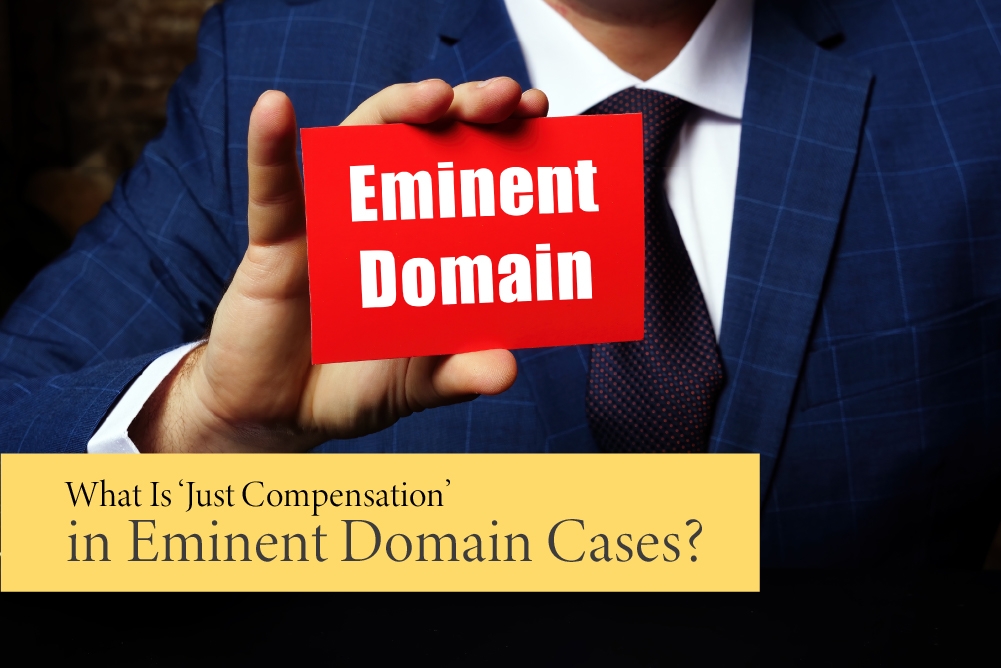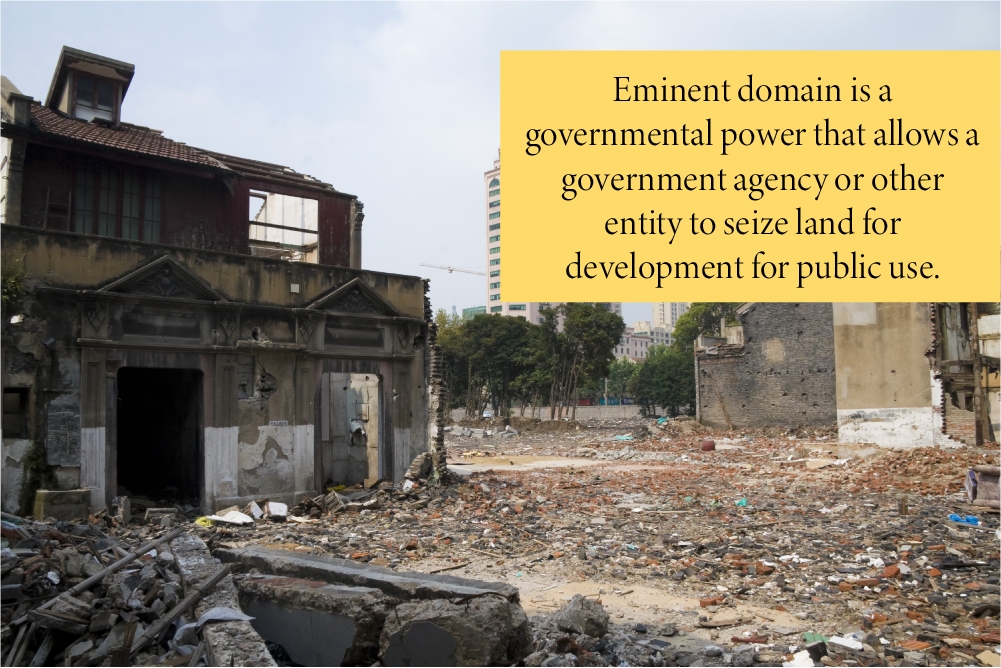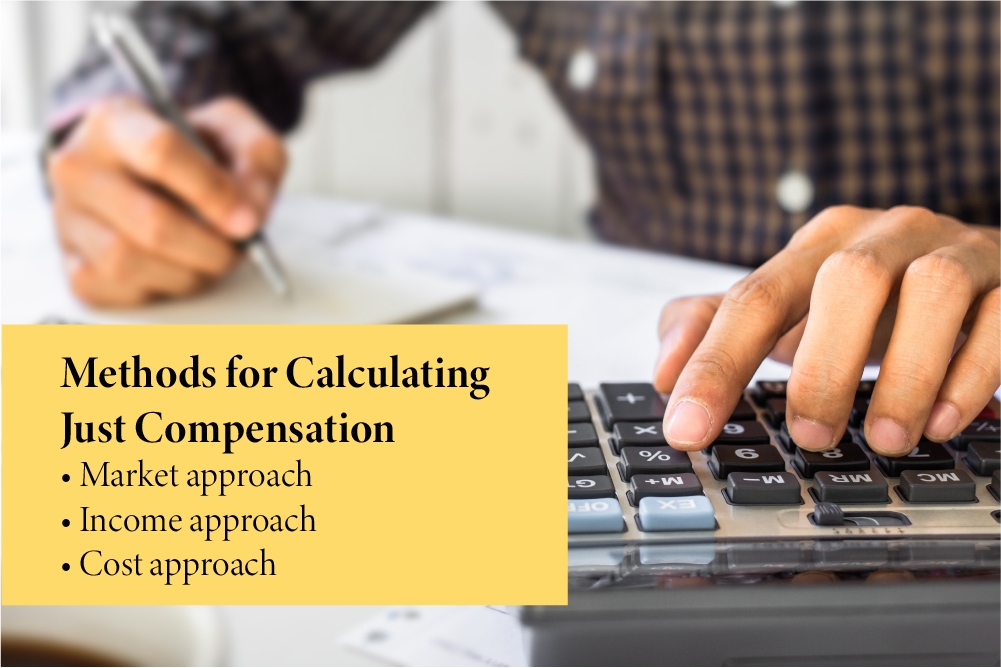Eminent Domain Lawyer in Indiana
What Is ‘Just Compensation’ in Eminent Domain Cases?

An eminent domain lawyer in Indiana works to uphold the rights of people facing property condemnation. The primary concern will be ensuring that they receive “just compensation” for the loss forced on them by the government. Federal and Indiana laws require a condemning authority to pay the owner of a property condemned through eminent domain. The just compensation should total the financial losses that arise from the loss of your property. You can think of it mainly as the fair market value, although the calculation can be complex. It is not always as simple as figuring out the price that you would normally list a property for sale. This dollar figure is usually the main point of dispute during eminent domain negotiations or litigation.
Basic Eminent Domain Terminology
Eminent domain is a governmental power that allows a government agency or other entity to seize land for development for public use. The Takings Clause within the Fifth Amendment of the U.S. Constitution established this power at the federal level. In Indiana, laws about eminent domain are also found within Article 1, Section 21 of the Indiana Constitution. Both state and federal laws require that property owners receive a fair price.

As someone involved in an eminent domain case, you will encounter these terms:
Condemning authority – This is the entity, such as a municipal government or utility company, that intends to condemn a private property for conversion to a public use. Although public use is essential for exercising eminent domain power, land conversion does not have to benefit many people. Over the years, legal cases have defined public uses very broadly.
Taking – A general term used to refer to the property being condemned.
Fair market value – The marketplace of buyers and sellers establishes property value. The sale prices paid for comparable properties form the starting point of calculating a fair market value at any point in time. The quality of existing buildings and other improvements factor in as well. If you are dissatisfied with an appraised value presented by a condemning authority, then you could hire an eminent domain lawyer to challenge the calculation.

Residue damages – At times, property owners do not lose their entire property to an eminent domain action. They only lose a partial amount. However, this loss can impact the value or function of the remaining land left in the owner’s possession. A common type of residue damage is a home that loses setback from the road when a road is widened. A condemning authority may hope to ignore residual damage, which is why working with an eminent domain lawyer in Indiana is so important. You do not want to miss opportunities to collect the total value of your loss.
Cost-to-cure damages – Development of part of your land could disrupt a vital part of your property’s infrastructure. For example, development that would overtake a water wellhead or septic tank inflicts disastrous consequences for the homeowner. The cost to fix or “cure” the problem must be included in the just compensation.
Other damages – Real estate cases never cease to surprise with unexpected details. Laws about eminent domain in Indiana include other damages to account for losses that do not fit into other categories.
Benefits – On rare occasions, an eminent domain condemnation and subsequent development could be seen as benefiting the property owner who lost a portion of land. For example, developing a park next to a residence might be viewed as a benefit. If a condemning authority is trying to label your loss as a benefit, you should consult an eminent domain lawyer at Webster & Garino, LLC. We will scrutinize the proposal to evaluate its real impact on your property value.
Read more on the steps to take for estate planning in Indiana.
Methods for Calculating Just Compensation
Multiple approaches to determining just compensation exist. Your property’s characteristics and unique features direct which method you should choose.

Market approach – You may already be familiar with the market approach because it is how most people calculate a fair market value, especially for a residential property. An appraiser compares your property to what similar properties in your area have sold for recently, and real estate agents call this running comps.
Income approach – Properties that produce income, like a farm, nursery, or apartment building, have their values based more on their income-generating capacity than the price of similar pieces of real estate. After calculating the net operating income, an appraiser applies a capitalization rate multiplier to determine a property value.
Cost approach – Occasionally, property includes a specialized building that fulfills a niche function. The purpose of the building cannot be easily replaced. Therefore, the cost to replace the specialized structure in another location becomes the central factor in calculating just compensation. This is then added to the value of the bare land it occupies.
Factors That Influence Just Compensation
An appraiser takes into account many aspects of a property, including:
- Property size
- How the eminent domain condemnation could affect access to the remaining property
- Zoning
- Unique and special characteristics
- Level of existing development
- Current use or potential use
- Intersection of Adverse Possession and Eminent Domain
Eminent domain cases become even more complex if adverse possession enters the picture. Adverse possession in Indiana is the legal concept that potentially allows people who occupy, control, and take care of a property to become legal owners even without buying the land. Someone must have continual control of a property for at least ten years to move forward with an adverse possession action.
Disputes between the recorded landowner and someone with an adverse possession claim raise the question of who should receive just compensation from a condemning authority. Land ownership issues of this complexity and importance justify hiring an eminent domain lawyer in Indiana.
Speak With an Eminent Domain Lawyer in Indiana
Few people appreciate the news that their home or part of their land will be subject to an eminent domain condemnation. Although you likely have little legal ability to prevent the land development, you do have the right to push for an accurate calculation of just compensation.
A real estate lawyer at Webster & Garino, LLC understands the issues confronting property owners and will work hard to resolve your case fairly. You should not assume that the first offer of compensation represents a comprehensive accounting of your losses. Ask us to evaluate your case and prepare a response. Call 317-565-1818 or email our office today.

